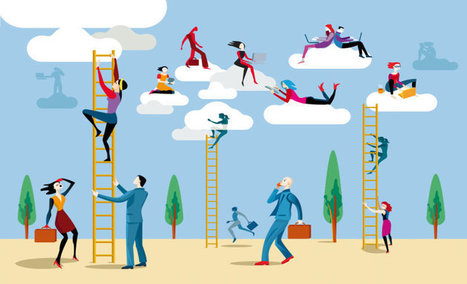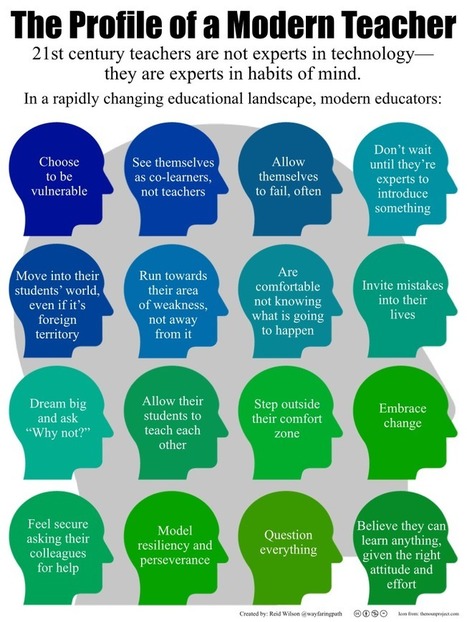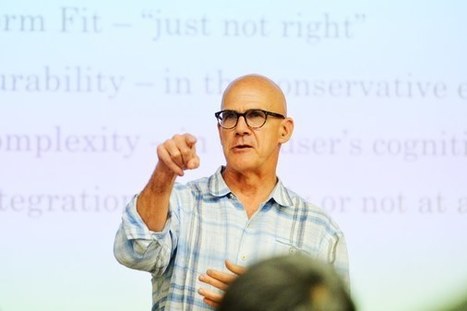A change management expert tells me why success in digital transformation projects depends on a keen sense of empathy for the people affected
Get Started for FREE
Sign up with Facebook Sign up with X
I don't have a Facebook or a X account
 Your new post is loading... Your new post is loading...
 Your new post is loading... Your new post is loading...
Sarah's curator insight,
June 4, 2017 8:25 PM
This is a short article on the ways that teachers' roles are changing. It is important to note that teachers are not becoming obsolete, but are just as important as ever. Teachers are here to facilitate learning and assisting the students in becoming resilient, self directed and capable learners.

Mariann Gissella Castillo Herrera's curator insight,
December 3, 2020 12:07 PM
These are the types of changes in the teacher's role that are fundamental to developing students who are capable of independent learning and reinvention in a rapidly changing world.
Luisa Fernanda Giraldo 's curator insight,
December 4, 2020 11:58 PM
We can observe a significant change in the teacher's role. Nowadays, students are more independent in the learning process, and due to the pandemic situation, students are forced to create new study habits to learn by themselves. However, the teacher still plays a fundamental role in classes and provides different tools to help students improve while learning.

jmoreillon's curator insight,
March 27, 2015 9:42 AM
This is what school librarians have been doing forever! 
María Florencia Perrone's curator insight,
April 8, 2015 4:00 PM
The world around us is not labelled or divided in categories, then why is academic content? Can we not relate topics and elaborate meaning on the basis of relationships and intertwined data? 
Dr. Helen Teague's curator insight,
April 13, 2015 9:11 PM
I wonder if this would work in the U.S.? Also, in Finland, students do not take standardized tests until the end of high school (Zhao, 2012, p. 111), so thankfully, perhaps the drill and kill process is diminished. *Zhao, Y. (2012). World Class Learners. |

rodrick rajive lal's curator insight,
May 28, 2017 10:54 PM
The constant pressure on being creative can dry up the stream of ideas. One might have to rebrand one'self in order to appear at one's creative best!
homeelevatorofdallas's curator insight,
May 29, 2017 3:09 AM
vacuum elevator repair dallasDo your elders struggle to travel between floors? Connect with Home Elevator of Dallas to install a new elevator at our home to freely travel to different floors of your home. In addition, they will increase the market value of your home as well. To get yourself a home elevator, visit homeelevatorofdallas.com 
CCM Consultancy's curator insight,
October 29, 2017 1:41 AM
In order to feel open and confident enough to innovate, you have to ensure you aren't dwelling on the past setbacks or future worries. Research suggests meditation can help you tap into new insights.

The Learning Factor's curator insight,
April 4, 2017 8:07 PM
Research suggests that the best self-help advice may have very little to do with yourself. 
Jerry Busone's curator insight,
April 5, 2017 9:03 AM
Key facet to succeed learning to like those around you 
Susanna Lavialle's curator insight,
April 9, 2017 9:16 AM
Many things change as you change your life attitude or your perception of others. The good thing is that if we decide, we can choose to be more positive - and assume others are as well... So smile and the world might just smile back.
|















If you plan to go digital, show empathy to the person affected through storytelling ;)
Muy interesante este artículo de Phil Wainewright (@philww).
La transformación digital no es dotar de herramientas y tecnología para mejorar el trabajo. Es transformación y adaptación al cambio.
Necesita de la empatía de las personas.
Necesita de conversaciones.